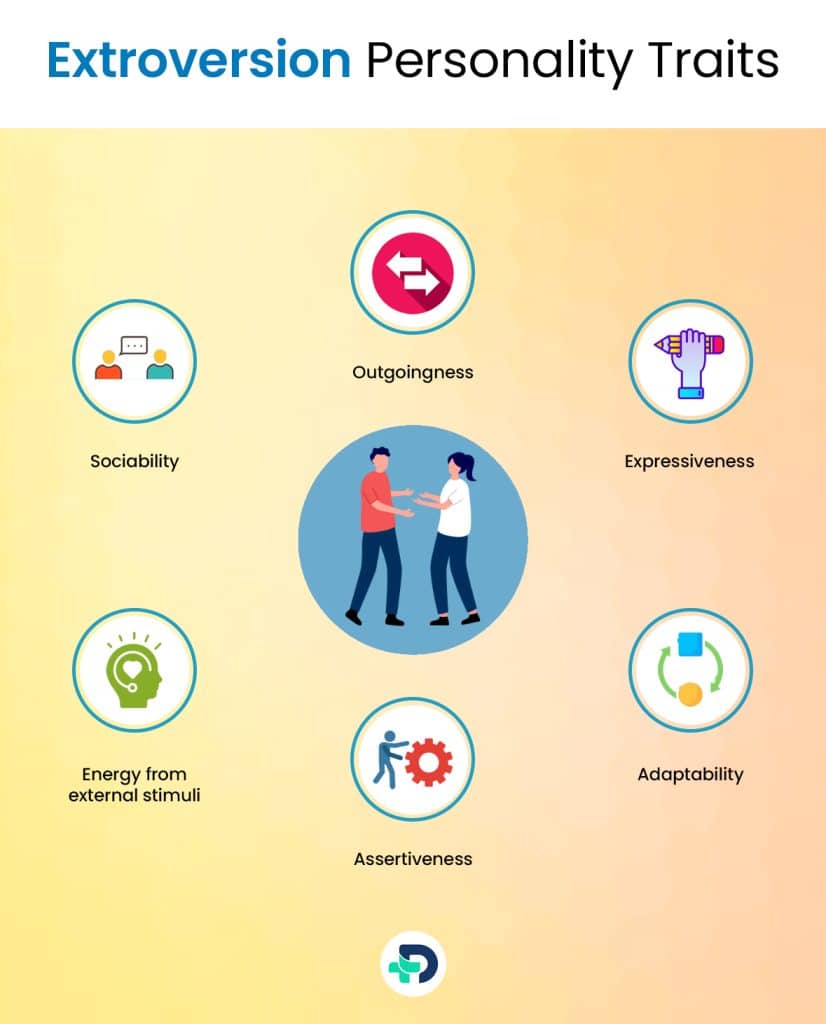Extroversion: Unveiling the Strengths and Dynamics of Outgoing Personalities

- Extroversion
- 22 Aug 2023
Overview
Overview
An extrovert seeks out and enjoys social interactions with the outside world. They are frequently characterized as outgoing, energetic, and friendly.
This article explores the fascinating world of extroversion, illuminating its complexities, advantages, and effects on people’s lives. We can better comprehend extroversion’s influence on a person’s behavior, ideas, and emotional responses by viewing it within the framework of this commonly used theory.

Personality traits

Extroversion Personality traits
Extroversion personality qualities can include various features frequently linked to those who exhibit extroverted tendencies. Here are some essential characteristics that are commonly connected:
- Sociability
- Outgoing nature
- Tends to express emotions
- Energy from external stimuli
- Positive nature
- Adaptability
Sociability
- They are renowned for their innate preference for and pleasure in social engagement. They tend to have an extensive network of friends and acquaintances, enjoy being in social situations, and get their energy from being among other people.
Outgoingness
- They tend to be gregarious, strike up talks, and interact with others. They like being the center of attention and easily discuss with strangers.
Expressiveness
- They tend to be vocal and honest about their feelings, thoughts, and opinions. They are more prone to express their thoughts and emotions verbally and gladly share them with others.
Energy from external stimuli
- They get their energy from things outside themselves, such as relationships, occasions, and new experiences. They frequently seek out stimulating situations and activities to feel energized and involved.
Assertiveness
- They typically have strong self-confidence and speak up for themselves when necessary. They frequently possess the self-assurance to speak up in front of groups and take the initiative.
Adaptability
- In social settings, they frequently exhibit flexibility and adaptability. They quickly adapt their behavior to meet the demands of various social circumstances since they feel at ease in dynamic and changing environments.1Personality traits| Researched based study from Nlm.nih.gov ,2Personality traits| Researched based study from Nlm.nih.gov
Effects
Effects of Extroversion
They frequently display a cheerful and enthusiastic attitude. They tend to be active, joyful, and upbeat, which may help them interact and establish connections with people.
External processing
- They frequently choose to process their thoughts and ideas externally and ponder aloud. To acquire clarity and produce fresh insights, they can find it helpful to talk about their ideas with others.
Taking initiative
- They are often action-oriented individuals who delight in participating in events and team activities. They could appreciate working in teams and frequently thrive in collaborative environments.
Risk-taking
- They might be more likely to take chances and enjoy novelty. They frequently accept ambiguity, are open to new things, and are unafraid to leave their comfort zone.1Effects| Researched based study from Nlm.nih.gov ,2effects| Researched based study from Nlm.nih.gov
Vs Introversion
Introversion and extroversion
These two dissimilar personality qualities reflect where people get their energy, focus, and worldview preferences from. Here are some significant variations:
Focus of energy
- In contrast to introversion, which involves focusing energy and attention inward on thoughts, feelings, and inner experience, extroverts tend to focus their energy and attention outward toward the external environment and social interactions. Introverts recharge by spending time alone or in environments that encourage introspection.
Social interaction
- Conversely, introverts may find social encounters exhausting or overwhelming and prefer quieter, more personal groups or one-on-one chats. Extroverts are usually at ease and seek out social interactions because they like being in the company of others.
Stimulation preferences
- Extroverts typically prefer higher levels of stimulation, while introverts prefer lower grades and may find excessive loudness, crowds, or sensory overload taxing. They may flourish in environments with sensory input, such as parties, concerts, or a busy work environment.
- Introverts may be more deliberate and reserved in their communication; they may carefully weigh their words before speaking and frequently process their thoughts internally.
Communication style
- In contrast to introverts, who may be more contemplative and reserved in their communication, extroverts frequently have a more talkative and expressive communication style.
- Introverts often process their thoughts internally before speaking and may carefully weigh their words before speaking.
Solitude and reflection
- While they may enjoy reading, writing, or engaging in hobbies that allow for deep thought, introverts generally find energy and fulfillment through social interactions. They often value and seek solitude as a way to refuel and reflect.
Social factors
- They frequently enjoy taking on leadership roles, being the center of attention, and actively participating in group activities. They may also be more observant and thoughtful in group settings, where they contribute sparingly. Extra words frequently feel comfortable and thrive in groups.6Vs Introversion| Researched based study from Core.ac.uk
Benefits
Benefits of Extroversion
- Strong communication skills
- Networking and social connections
- Confidence in social situations
- Leadership and influencing skills
- Energized by social interactions
- Adaptability and flexibility in various social environments
- Enhanced problem-solving abilities
- Enjoyment of public speaking and presentation.4Benefits| Researched based study from Nlm.nih.gov
Challenges
Challenges of Extroversion
While it has benefits, it also presents a unique set of difficulties. Here are a few typical challenges that extroverts may experience:
Need for external stimulation
- They could become restless or bored in quieter or solitary situations.
Exhaustion and overstimulation
- Due to their interest for intense social contact and external stimulation that produces excessive sensory input or prolongs the sense of being mentally and emotionally exhausted, extroverts can be vulnerable to overstimulation.
Having trouble being alone
- People frequently enjoy social connections and may experience loneliness or restlessness if they don’t often have social engagement possibilities.
Impulsivity and risk-taking
- Their preference for outside stimulation can occasionally lead to rash decisions and a higher propensity for taking risks.
Less focus on internal reflection
- They could spend more time concentrating on interpersonal relationships and less time reflecting on their ideas and feelings, which could hinder their ability to become more self-aware and advance personally.
Difficulties with active listening
- There may be difficulties and active listening because of their propensity to participate actively in social interactions and conversations.
Balancing one’s boundaries
- They may have trouble saying no to social invitations, privatizing personal time and self-care, leading to possible burnout, or neglecting their own needs. They may struggle with setting and maintaining personal boundaries.5Challenges| Researched based study from Researchgate.net
Life domain
Extroversion in various life domains
Extroversion in organizational behavior
- It can offer advantages in many professional settings. Careers with frequent social interaction, networking, and leadership roles can be well suited for extra words.
- They may excel in sales, customer service Public Relations, event planning, and other areas requiring communication and relationship-building skills.
- They often enjoy collaborative work environments where they can actively contribute ideas and engage with a colleague.
In personal relationships
- They frequently enjoy socializing and spending time with friends, family, and partners. They might be perceived as outgoing, making it simpler to establish new relationships and keep up with existing ones.3Life domain| Researched based study from Researchgate.net
Any feedback on this article?
 This Articles content was accurate
This Articles content was accurate Very Informative Article
Very Informative Article I have a question or a comment
I have a question or a comment
 This article contains inaccurate content
This article contains inaccurate content This article was not helpful
This article was not helpful I have a question or a comment
I have a question or a comment
We appreciate your helpful feedback!
Checkout our social pages
References
-
National Library of Medicine
What is Extraversion For? Integrating Trait and Motivational Perspectives and Identifying the Purpose of Extraversion | Personality traits
-
National Library of Medicine
Extraversion personality, perceived health and activity participation among community-dwelling aging adults in Hong Kong | Personality traits
-
Research Gate
Extraversion: Nature, Development and Implications to Psychological Health and Work Life | Life domain
-
National Library of Medicine
The Extravert Advantage: How and When Extraverts Build Rapport With Other People | Benefits
-
Research Gate
Addressing the imbalance: The downside of extraversion and the upside of introversion | Challenges
-
CORE
The Correlation between Introversion Extroversion and Measures of Happiness | Vs Introversion



































